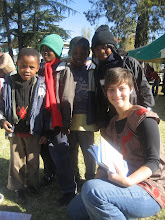You know you’re really a part of the family when it’s your night to make dinner. I’ve been in Lesotho for a full week now, and my surroundings have changed dramatically since my previous post. Initially, I was living in a Guest House in Khubatswana, but I have since moved into the home of a local family who live near the centre, still in the neighborhood of Khubatswana. To arrange my housing, two of the artists I work with and very scientifically went knocking on doors a few days ago and a wonderful family, headed by a very kind woman in her mid-30s, agreed to host me for the duration of my stay. The opportunity to live in the neighborhood and experience it firsthand is an perspective I never could have dreamed of getting living in an isolated room in a guest house, and it has completely transformed my vision of the neighborhood I can now officially call home.
My presence here has admittedly caused a small stir. One of two white people living in the entirety of my neighborhood (and not a Peace Corps volunteer), I finally got to meet the local chief - who dresses in jeans, a sweater, and a knit hat like every other Ndate (father/man) – in order to receive approval from him to live here. I also got to meet some local young men, who showed up at my door yesterday morning to say hello and get a good glimpse of me. I think they were slightly disappointed that I wasn’t friendlier, but to my credit it was 8 in the morning – the next time I’m the only white person in town I’ll make sure to be more of an early bird.
Race raises some obviously interesting questions here, but few of them have turned out to be the issues I anticipated. Some people stare curiously, while in the city some people simply raise an eyebrow in my direction. Out in Khubatswana, some people want to practice their English, and still other people give me uncomfortably deferential treatment in light of my skin color – like a man at the bank who insisted I cut him in line and patronizingly patted me on the back - but nobody ignores it. Part of the acknowledgement surely stems from a perforated language barrier – while everyone in Lesotho attends school in English, some people are understandably uncomfortable with it and I try whenever possible to learn and practice my limited Sesotho. But part of it is that I am now a white woman living in an African nation. My neighbors are black, my host family is black, the people on tv are black, and the famous musicians are black. While catching glimpses of myself in the mirror has begun to become unsettling, and I certainly don’t enjoy it when children under two cry at the sight of me and it’s explained to me that they don’t know what I am, I have also felt an incredible sigh of relief being able to throw off America’s colorblindness and come out with it already – I’m white, and that’s just how it is.
When I explain to people, especially neighbors of the Centre, that I have come to Lesotho because I care about the unique way their community is cultivating a love for reading in their children and encouraging a culture of reading in their country, they seem really receptive to my intentions. When I attempt to speak my broken Sesotho, they are patient with my efforts (even when I ask people to repeat their names ten times in an hour and eventually write them down for me) and appreciative that I am really trying. When I ask them questions about their lives, they are eager to share and eager to question me in return. It might be easy to feel different and out of place here given my inability to blend into a crowd, but when a young girl tells me she dreams of becoming a scientist or doctor and I get to see they way a group of local artists throw themselves into building up their community from the inside out, Khubatswana our struggles look pretty much the same.
Tuesday, June 16, 2009
Subscribe to:
Post Comments (Atom)


Even though you're white, I still love you.
ReplyDeletei would love you even if you were purple.
ReplyDeletelauren this is so interesting! i am interested to hear more about the funerals you were talking about in the last post. what are they like, they sound so central to the culture. i'm sure you'll get there, this is so exciting, thanks so much.
ReplyDeletelove.